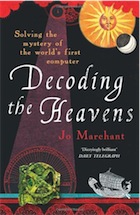Jo Marchant on science writing: 'You need a burning curiosity'
Our blog to accompany the 2013 Wellcome Trust Science Writing Prize asks top science writers about their craft.
Today we speak to Jo Marchant, a former editor for Nature and New Scientist, and author of Decoding the Heavens
Today we speak to Jo Marchant, a former editor for Nature and New Scientist, and author of Decoding the Heavens

'I happen to have a PhD in genetics but that technical knowledge doesn't help me when writing about archaeology or physics.' Photograph: Rex Features
What makes a good science story?
There are three components to the perfect science story. The first is the intellectual leap or excitement that a particular piece of research brings. Second, the practical implications – how will this research change our lives? The third is the human story – for example a race between two feuding teams, a reclusive mathematician who makes a breakthrough (or doesn't) after working for years in his attic, or a baby saved by a new transplant technique.
There are three components to the perfect science story. The first is the intellectual leap or excitement that a particular piece of research brings. Second, the practical implications – how will this research change our lives? The third is the human story – for example a race between two feuding teams, a reclusive mathematician who makes a breakthrough (or doesn't) after working for years in his attic, or a baby saved by a new transplant technique.
You can get away with just one or two of these components if they're strong enough, but if a story scores highly on all three, you're on to something big.
What do you need to know to write well about science?
I don't find it that helpful to talk about core information that a science writer needs to know. Having background knowledge in a particular field may help you to follow what a scientist is saying or to interpret how significant a particular advance is. But it isn't essential. I happen to have a PhD in genetics but that technical knowledge doesn't help me when writing about archaeology or physics, and I know some brilliant science writers who have no formal training in science at all. Sometimes knowing too much about a subject can alienate you from your audience – you end up writing for other scientists, and it's harder to see what an ordinary person will find interesting or important about a story.
Instead, it's crucial to have the right attitude. You need a burning curiosity – about how the world works, what people are doing, why they are doing it and why it matters. Think hard about what people tell you and make sure you understand it on the deepest possible level. If you don't, keep asking questions until you do.
This goes for the technical details of a piece of research – such as why an astronomer is imaging the sky using a particular wavelength of radiation – to more human ones such as why that astronomer has dedicated his or her career to examining the sky in the first place. If you don't feel compulsively interested in such questions, don't become a science writer.
How do you choose your opening line?
I look for something concrete and specific – a small detail, but one that plunges the reader into the heart of a story and gives them no choice but to read on. Science stories are full of complex, abstract ideas, but if you start with those, readers might not make it past the first paragraph.
The scene you start with needs to be central to the theme of your article, or it will feel contrived. Ideally it should be colourful, dramatic, personal and intriguing, and it should have a certain emotion to it, so that it reflects the rest of the article in terms of the atmosphere it evokes, not just the information it contains. And of course if it's something you can return to and bounce off at the end of your piece, so much the better.
Looking back at a few of my own opening lines, I usually start with a defining feature of a place, object or person that will be key to the article. I'm trying to set a scene so the reader immediately starts to imagine themselves there:
"It looks like something from another world – nothing like the classical statues and vases that fill the rest of the echoing hall."
– In search of lost time, Nature
– In search of lost time, Nature
"High in the mountains of northern Colorado, a 100-foot tall tower reaches up through the pinetops."
– How meditation might ward off the effects of ageing, the Observer
– How meditation might ward off the effects of ageing, the Observer
"Charles Thompson hunted monsters."
– The world's biggest whopper, New Scientist
– The world's biggest whopper, New Scientist
"It is a strange combination of clumsiness and beauty."
– The evolution machine, New Scientist
– The evolution machine, New Scientist
"From the circular main hall of the Sackler Library in Oxford, an unassuming corridor leads to a staircase that takes you down below street level."
– The secrets of Tutankhamun, the Observer
– The secrets of Tutankhamun, the Observer
How do you get the best out of an interviewee?
There are probably as many different answers to this question as there are interviewees. Ideally you need to get a feel for what makes them tick. This can be tough when doing an interview on the phone, which is why it's always better to talk to someone in person if you can. Some people may respond to flattery, others to a crisp, business-like approach. It's also important that you don't care about looking dumb. Stupid-sounding questions are often the ones that get right to the heart of why something is important. And remember that you need to have a conversation on a level that is going to work for your readers. There's no point talking in jargon to impress your interviewee if the only quotes you get are much too technical to use.
Try to be aware of your interviewee's concerns – if they are pushed for time, can you call back later? If they're worried about being quoted out of context, can you explain a bit about your working process, or offer to check back quotes at the end of the interview? And don't expect them to read your mind. You'll get the best results if you explain at the start exactly what it is you need – the main points that interest you, the kind of article you're writing and the audience you're aiming for.
How do you use metaphors and analogies in a story?
I think science has a love-hate relationship with metaphors. On the one hand, all scientific theories and models are themselves metaphors to one degree or another – they are the only method we have to represent and make sense of the world, bar talking in numerical equations. On the other hand, metaphors are never a perfect fit.
For example, the popular image of the genome as an instruction book has a lot going for it, conveying the dense information content of DNA and the idea that it can be faithfully copied over and over. But using this analogy suppresses other important aspects of the genome, such as the ease with which genes interact with the environment.
Metaphors and analogies are essential to good science writing, but used unwisely they confuse or obscure rather than clarify. Don't scatter them carelessly, while congratulating yourself on the vibrancy of your prose. Select each one with precision. Why have you chosen it, what job does it do, what aspects of the metaphor do and don't work?
Another danger is that readers might take your poetic descriptions literally. I once whimsically described the Antikythera mechanism (an ancient Greek clockwork device that models the motions of the sun, moon and planets) as a "time machine" because by winding the handle you can simulate how the sky will look at any moment in the past, present or future. An angry researcher demanded that I correct my erroneous description, since the mechanism does not actually allow you to travel in time.
What do you leave out of your stories?
Knowing what to cut is something that many science writers don't think about anywhere near enough. With online content, people can write as long as they like, and I wonder if we're losing a certain discipline that came with writing a story to fit a slot on a printed page, and knowing that if you didn't cut your story to length, someone else would.
Above all, be aware of what your article is trying to achieve. What is the overall point, and what story are you trying to tell? Slice anything that doesn't work directly towards those aims, no matter how fascinating you think it is. There are countless fascinating facts in the world, but they don't all have to be in your article.
Be particularly wary about details that took a lot of effort to find out, because those are the ones that you'll be keenest to keep in, regardless of their value to the story. And make sure you're not including a quote or detail simply to prove that you spoke to someone, or visited a particular lab. If you can't say exactly what job it's doing for the reader, cut it.
After pruning the ideas and information in your article, go through it again and cut all extraneous words. Know what you want to say in each sentence and pride yourself on doing it in the fewest words possible. If you're a wonderful writer you can break these rules, but otherwise be kind to your readers. Wouldn't you prefer an elegant, flavour-packed morsel to a bloated bucketful of stodge?
How do you stay objective and balanced as a writer? Should you?
It's impossible to be completely objective. We're all human, and every article is subjective to some degree. Every decision you make – what to write about, who to talk to, what quotes to include – gives a piece a certain perspective, which would be different if someone else had written it.
That said, there's a scale. Some articles are more objective than others. If you want to write a polemic, that's fine as long as it's clear to readers what you're doing, but generally I'd recommend aiming for balance. That means being honest with yourself about your own preconceptions and prejudices, and doing your best to puncture them.
What's the biggest potential pitfall when writing about science?
Obviously getting your facts wrong is a particular pitfall when writing about science. Check everything three times. And I mean everything – for one of the first articles I wrote, I checked and double-checked every last technical detail, only to realise after the article appeared that I had misspelt the researcher's name.
Otherwise, I think the biggest danger is slipping into "lecture mode" – trying to educate or impress readers. Nothing will turn them off quicker. Science writing should not be about you looking clever. Your job is to make your readers feel clever, by making your material simple.
• Jo Marchant's first book, Decoding the Heavens: solving the mystery of the world's first computer, was shortlisted for the Royal Society Prize for Science Books in 2009. Her next book, The Shadow King: the bizarre afterlife of King Tut's mummy, will be published by Da Capo press in May 2013.
• Read some Jo Marchant – we like In search of lost time published in Nature.
• Find out more about how to enter the Wellcome Trust Science Writing Prize, in association with the Guardian and Observer, on the Wellcome Trust website – the closing date is 28 April 2013.

No hay comentarios:
Publicar un comentario